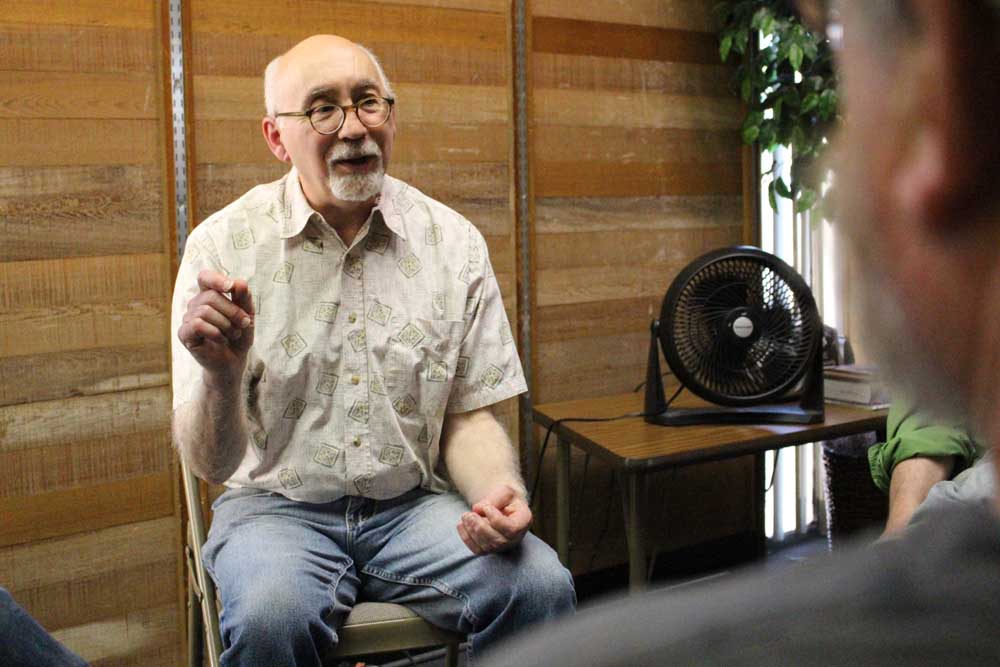SECURITY/PRIVACY
Published 4:10 am Friday, May 13, 2016

- During the Oregon Humanities Conversation Project's event “Keeping Tabs on America,” Astoria City Councilor Drew Herzig shared his thoughts on the transparency of citizen's lives to a less-than-transparent government surveillance infrastructure.
Government surveillance, carried out under the banner of security, has advanced so rapidly that society’s customs, expectations and laws regarding privacy have not kept up with the sea change.
The issue is often framed as a zero-sum contest between security and privacy: How much surveillance is enough, and how much is too much? Who decides?
Kristian Williams — an author and freelance writer whose work has focused on how policing, counterinsurgency and government use of torture impacts human rights and civil liberties — posed these questions to a group gathered at the Astoria Public Library last week.
“I think, unless our understanding — both collectively and individually — starts to advance very rapidly, we’re not going to get to make choices, even as a society, about whether privacy exists. It will just be gone, because of our inattention and sort of cultural lag,” he warned.
The event, “Keeping Tabs on America,” part of the ongoing Oregon Humanities Conversation Project, drew locals concerned about the scope of government surveillance, and who questioned whether screening every cellphone call and peering into every private life was an effective, or socially desirable, way to keep Americans safe.
Though some attendees stood up for surveillance, casting it as a “necessary evil,” they were the outliers in the crowd.
Almost everyone agreed that the post-9/11 surveillance apparatus is not going away anytime soon, and that the loss of privacy — from corporations tracking customers’ purchasing habits, to living under the expanding gaze of security cameras and smartphones — is something younger generations aren’t as worried about; in the social media age, they grow up acclimated to lives of full disclosure.
“They tend to be on the side of, ‘I don’t understand what the big deal is. I live my life online,’” Williams said.
Astoria City Councilor Drew Herzig, echoing writers on the topic, pointed out that as citizens have become more transparent to the government, the government has become less transparent to citizens.
What do they get in return? Is blanket surveillance effective at preventing crime? Doesn’t seem to be, according to Williams.
For example, in the time since London installed tens of thousands of security cameras, crime hasn’t decreased at all, he said. (But there has been a rise in criminals wearing masks while committing crimes.)
And since there aren’t employees watching all of the security footage in real time, oftentimes the best law enforcement can do is identify and catch criminals after the fact by retracing their movements.
In other words, the surveillance information is often more useful for forensic rather than preventative purposes.
The same is true at the U.S. National Security Agency (whose unofficial motto is “Collect it all”). The agency gathers and stores such an overwhelming amount of electronic info that it is impossible to analyze every data point. But when the NSA knows what it’s looking for, it can sift through its storage and nose it out.
In addition, an FBI Inspector General report from last year revealed that the bureau’s collection of phone records between 2004 and 2009, as authorized by the USA Patriot Act, did not itself foil any terrorist attacks.
But, even if government agencies’ collection of personal data had helped to thwart attacks, would that be worth living in a panopticon state?
At least one person at Williams’ talk said “no.” Another said he would be more willing to support a period of heightened national surveillance, provided it was a stopgap and would be reined in when the threat had passed.
Astoria Mayor Arline LaMear took a measured view of surveillance.
“I think there are times when surveillance is important. We’ve talked about all the negatives, but I’m happy when they take a look at who’s coming on board airplanes and so forth when I’m flying,” she said. “It’s hard to know how to balance the whole thing.”
Williams raised a question so basic that even the most emphatic opponents of surveillance forget to ask it:
Why do we value privacy in the first place? Why do we care if our privacy is invaded?
“What is it about this idea of having unobserved space, or unobserved time, that we find valuable?” he asked.
One possible answer: To maintain our sanity, and to feel like ourselves, we need room to drop our guards, to unselfconsciously behave as flawed beings — to tell off-color jokes and sing out of tune, write careless texts and emails, behave vulnerably and emotionally, use the bathroom and be sexual.
“It’s not like we don’t do those things in public because we’re ashamed of them,” Williams said. “It’s just that we don’t do those things in public because we don’t want to.”
The “unobserved space” is where we store the blooper reels of our lives, the outtakes that prove we’re human. When that space is monitored and the details shared without our consent, it feels like a fundamental violation — a trespass against our dignity.
What’s more, when we know that such monitoring may be taking place, we cannot help checking our own behavior, acting as our own prison guards, even in private.
In a sense, when we submit to surveillance measures, we give up the freedom to fully relax. Several people at Williams’ talk reckoned that is a rather steep price for safety and security.
And make no mistake: At the heart of every pro-surveillance sales pitch is the promise that it will make society safer and more secure.
“Personally, it think that the burden of proof that it does do that needs to be on the people who are exercising authority,” Williams said. “I think this should remain a question, but it’s a question that people who are exercising the control should be able to answer.”




